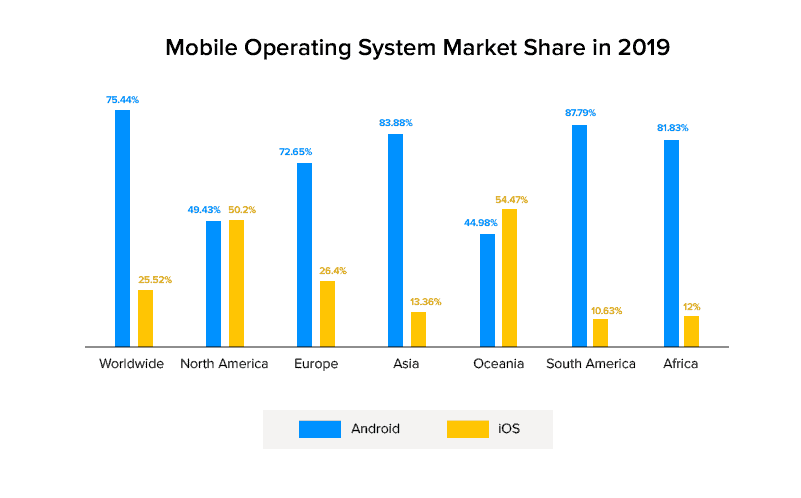Cross-platform application development has become one of the hottest app development trends, and for good reason: With platforms like Flutter and React Native being developed to a huge extent, cross-platform app development means important savings in terms of time and effort, as well as money.
However, with the benefits galore, a new problem has emerged: A number of cross-platform frameworks have emerged in the mobile application domain, making it confusing for startups to make a decision.
In this post, I’ll show you the best cross-platform app development frameworks that a startup can choose. If you’re an entrepreneur, this will help you make a wise decision that will help your company. Moreover, if you’re a software developer, I’ll help you note the tools that are here to stay.
The Rise in a Cross-Platform Development Approach
As you can see in the graph above, the segregation of Android and iOS users is not favoring either operating system. Globally, the world is divided between the two. For a brand that is able to get on both platforms in the least possible time and at an optimal cost, the opportunity to get a leg up on competition increases substantially. This realization is what has set the ground of cross-platform development frameworks.
Before we move on to look into the best cross-platform development tools, let us look into why the approach benefits startups massively.
What Are the Benefits of Cross-Platform Development
The advantages of a cross-platform development approach for mobile application development comes loaded with a series of benefits. Here are those that make it the most preferred option for startups:
- Wide market reach. Although we all have a favorite operating system choice, we cannot let our biases seep into the platforms we conduct our businesses on. Cross-platform applications, by being available on both Android and iOS, expand market reach on both platforms, giving startups the best of both worlds: Android reach and iOS revenue.
- Single codebase. A cross-platform development approach enables you to write code that covers different operating systems at once. A single codebase carries an influence on all the software development stages, enabling you to save money that would go into upgrading and fixing two separate pieces of code.
- Fast and inexpensive development. Since the developers have to work on a single codebase, the time it takes to design, develop, and maintain or upgrade an app is a lot lower than native application development. Obviously, this lowers the development cost to a great extent.
- Inconsistency in platforms. One of the biggest challenges that startups face in cross-platform development is inconsistency on Android, iOS, and web platforms. However, the modern-day cross-platform tools are packaged with functionalities that enable developers to create OS-specific applications from a single platform.
And now, with these benefits in mind, it’s time to take a closer look at the five best cross-platform frameworks a startup can use.
The 5 Best Cross-Platform Frameworks
Ionic
Ionic is one of the most popular cross-platform frameworks based on the AngularJS. It enables developers to make creative user interfaces and intuitive, interactive applications. This makes it a perfect fit for PWAs as well.
Features:
- It is an open-source framework allowing modifications in code structure.
- It’s based on the SaaS UI framework, which is designed for operating systems containing UI elements. Meaning, robust apps are a guaranteed outcome of Ionic app development.
- The fact that it is based on AngularJS makes it convenient for providing extension to HTML syntax. This comes in handy when adding attractive components and features in the application.
- It uses Cordova plugins, allowing access to device in-built features, such as GPS, Camera, and Audio recorder.
Flutter
A fairly recent entry in the cross-platform market, Flutter was introduced in 2017 by Google. And yet, in very little time, Flutter has become ideal for cross-platform development. The reason behind this is the dynamicity and uniformity it offers to apps that run across Android and iOS.
Features:
- It promotes a portable GPU that renders UI power, enabling it to work on new interfaces.
- It doesn’t call for manual update of the UI elements, for it comes with a reactive framework. The developers only have to update variables, as UI changes become visible after that.
- The fact that it expedites the development process and is cost-efficient makes it ideal for MVP development.
React Native
It is impossible to talk about cross-platform app development without mentioning react native. Developed on JavaScript, it is used for writing code that results in apps that come with a native-feel in the iOS and Android versions.
The framework merges the best elements of ReactJS and JavaScript in addition to offering the benefit of writing modules in Java, Swift, and Objective-C.
Features:
- It is an open-source framework backed with a massive community support that helps it in fixing issues and adding new feature sets.
- It comes with the benefit of one-time coding for developing applications that run on both iOS and Android. This also lowers the app development time to a massive extent.
- It gives a special focus to UI, giving birth to an immensely responsive interface. This means that the time needed for loading an app is reduced substantially.
Xamarin
Being a streamline framework used for building iOS, Android, and Windows apps through .Net and C#, Xamarin is very different from other frameworks on the list of cross-platform tools. It enables developers to use over 90% of code that otherwise would have been coded separately for three different platforms and operating systems.
Features:
- Xamarin apps are developed with the help of C#—a language that has a strong leverage over Java and Objective-C.
- It lowers hardware compatibility issues with the help of APIs and plugins that work with the common device functionalities.
- It provides robust compile-time checking, which results in lesser run-time errors.
Appcelerator Titanium

Features:
- It comes loaded with several rapid application development tools. Meaning, it aids quick prototype creation.
- It comes with ArrowDB, which enables the developers to deploy the data models with zero setup efforts.
- It comes with pre-built connectors that are present for MS SQL, MS Azure, Salesforce, etc.
Is 2021 The Year of Cross-Platform Software Development?
It is safe to presume that the more this pandemic continues, the greater will be the demand for a cross-platform development approach. The need for digital transformation blended with the limited set of monetary and team resources will bring in an increased demand for multiple platform and single codebase frameworks and tools.
However, we cannot dismiss the supremacy of native digital solutions in terms of quality and experience. On this front, we can envision frameworks adding a further boost in terms of features and ease of development and deployment.
In this post I showed you the five best cross-platform development frameworks that development agencies and businesses have been relying on for their multi-platform needs. Each one comes with its own strong points and features, so studying them should give you a good idea of what your own situation requires.
Armed with this knowledge, the next step would be to get in touch with your mobile app development agency and discuss which would best meet your project requirements.

